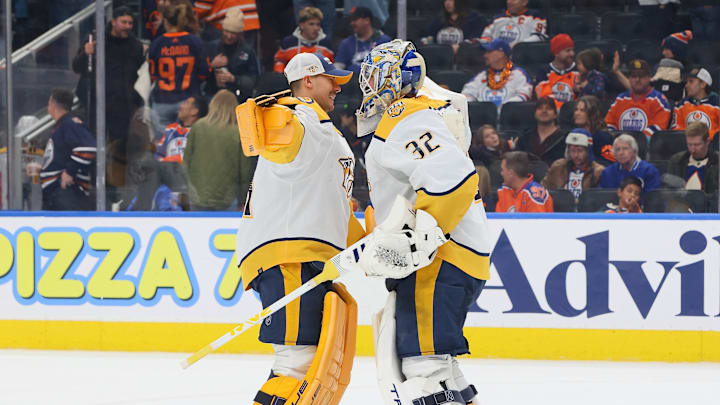Let's head off the issue at the very start. I am not, and nobody is advocating for Kevin Lankinen or Yaroslav Askarov to replace Juuse Saros as the starting goalie for the Nashville Predators. There just might be a case for us to see him more often than we're used to.
The Predators are at the exact halfway point of the season so far. Juuse Saros has started 32 games so far this season, and Lankinen has eight starts with Askarov making up the difference.
Lankinen has played in 12 games total, and has a record of 5-3 with a .901 save percentage and 3.14 goals against average. Not the world's greatest numbers, but with limited opportunities you can only expect so much. Askarov's NHL numbers aren't really relevant, but in the AHL he's 11-6-1 with a .920 SV% and a 2.13 GAA. He also just got AHL All-Star Team honors.
Hey now, you're an #AHLAllStar 🌟💫
— American Hockey League (@TheAHL) January 10, 2024
Details: https://t.co/vtiRI6nOVL
🎟️: https://t.co/DdZbhErr0G pic.twitter.com/ZMdCIAa8Ld
Advocating for more time for the backups isn't based on a numbers argument though, at least not on his play. As a whole, backup goalies are playing more. In 2012 the average starter played around 70% of the available starts. That put the goalies at around 57 starts a year.
That number has fallen way off as of late. In the 2022-2023 season that number dropped to 58%, which averages out to 48 starts. So the average NHL starter is playing just over half the season.
Predators Continue to Rely Heavily on Juuse Saros
The Predators have basically been the exception to the rule. In 2023 Juuse Saro's 63 starts were amongst the league leaders, and well above the average. His 67 starts in 2022 even further pushed away from the average of 48 starts. Both seasons featured great play from Saros, but ultimately ended in disappointment with missing the playoffs and an early playoff exit respectively.
The 56 game season isn't the best marker but because of the schedule compression, Saros took 35 starts and Pekka Rinne took 21. Saros had the best numbers of his career with the reduced workload. He also might have had his deepest roster defensively, but put that fact to the side for the moment.
The average goalie loses about 10 pounds a game thanks to the equipment they wear, the time on ice, and the physicallity of the position. It only gets worse considering that Saros is just about the smallest goalie in the league. At 180ish pounds, going through that 64 times a year can not be easy, and the constant weight fluctuation and rehydration are complicated to manage at the very least. There is a case to reduce his workload just based on that. Being fresh for a late season or playoff run is a legitimate concern.
Next, look at league trends. The Bruins are thriving with almost an even split in goal. That flies in the face of conventional wisdom yes, but it is serving as a model. Arizona, currently hunting the Predators (just 3 points behind) for a playoff spot has a close split, 23 games started to 17 games between their two goalies. Buffalo has played 3 goalies for 7 or more starts. Calgary has thrown 13 starts at their backup already. The Stars have split their games, 21 starts for Jake Oettinger and 18 for Scott Wedgewood. Detroit has played three goalies at least 10 times and are against just outside of a wild card spot.
Unless you have an elite goalie, games played are falling so much closer to a split than in previous years. With Jusse Saros, you have a special case. You have an elite goalie, who might need just a little more care than the average goalie.
With a fairly decent backup in Lankinen (The Athlethic ranks the Predators tandem as the 9th best in the league currently) and a very playable third in Askarov, there's no reason why the Predators shouldn't throw extra starts to the other guys.
If you need one more reason, then think about variety. Not only is it the spice of life but it keeps the players engaged. The curse of a great goalie is defensive apathy. The trust the Predators have in Saros is great, but can lead to laziness.
Nobody would ever say it, or admit it, but a team plays with a little more stress when they have their "backup" in. There is a reason pulling a goalie who is playing well but having bad luck is still used as the proverbial wake-up call. There's no reason it can't happen before the game.
